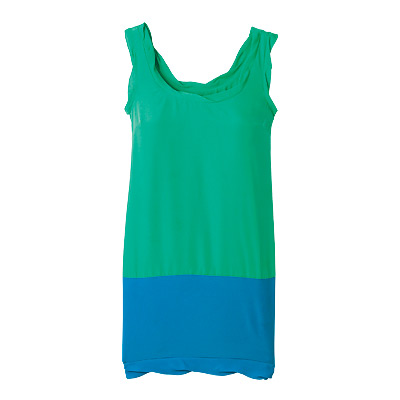Today I want to talk about dressing for proportionality. Proportionality is pleasing to the eye, and it draws the eyes of the beholder to the face (because no one part is "sticking out" so to speak). The only problem with proportionality is... most of us aren't! What's a girl to do? Why, create the illusion of proportionality, of course!
This is actually easier than it sounds. The first step is knowing your measurements and your body type (see the bold portion here for a brief explanation and how to take your measurements). This info is power. You need to know where your volume naturally occurs in order to balance it out. For example, if you are a pear shape, your natural volume is in your lower body. To create the illusion of proportionality you want to minimize your lower body's appearance while creating artificial volume on top. If you are an apple shape, the opposite is true. If you are an hourglass or a box, you can also use these principles to maintain proportionality and create the illusion of a more feminine figure.
The second step, creating volume, can be done actually (such as in the fabric and construction of a garment) or merely visually. Consider these easy pointers:
Manipulate the placement of color in your ensembles.
- Light colors add artificial volume and draw the eye
- Sheen adds volume
- Dark colors de-emphasize or streamline (because they recede)
- Monochromatic dressing streamlines
- The eye is drawn to the point where contrasting colors meet. Avoid meeting contrasting colors
at your widest points.
Manipulate the placement of line in your ensembles
- Horizontal lines (stripes, zippers, etc) can add artificial volume, but....
- One strong horizontal line across the narrowest point of the waist can be flattering
- A hemline draws attention, so think about where they fall. Unless you want legs to look wider,
avoid skirts that cut across the widest part of the calf or thigh (!) and long tops / jackets that hit the widest part of the hips
- Vertical and diagonal lines streamline
Manipulate the placement of pattern in your ensembles
- Pattern adds artificial volume, especially high contrast patterns (i.e. black on white versus charcoal on light grey)
- Solids (relative to pattern) streamline
Manipulate the placement of texture and structure in your ensembles
- Thicker naps can add artificial volume
- Cowls and collars can add volume, so do pleats and some pockets - place accordingly!
Now let's look at a two examples. I recently tried on this Thakoon shift dress (at a thrift store):
 |
| source |
Super cute, right? The point where green meets blue hit at the widest point on my thighs and it just wasn't flattering. Not terrible, but definitely not my best look. So I didn't buy it (remember the 100% rule). This is an example of creating volume and emphasis visually.
In the same shopping trip, I also found a "like new" J. Crew dress. I can't find an image of the exact dress, but the one below has a similar pocket situation.
| source |
I was so excited, but.... Again, not my best look. Why? Because the dress had cargo pockets that fell on the biggest part of my thigh, and the structure of the top portion of the dress was minimal. Let's just say the girls already need a little help to keep up with my hips. This is an example of actual volume, created by fabric and structure. Both of the dresses would probably have looked amazing on someone with an apple shape, because both would have complemented that figure with color and structure volume.
I can't end without showing you at least one thrift "keeper." Here it is:
Notice the black geometric pattern on this dress. The pattern draws the eye to the smallest portion of my waist, and then down to the hem, without adding undue emphasis to my hips. Isn't it all so fascinating? I could go on forever, but lucky you, I won't.



that dress!! it looks so good on you mary!!! might have to find a plain white dress i can paint that pattern on to! :)
ReplyDeleteThanks, Sheena! I forgot to mention that it's originally from target, but who knows how long ago?!
DeleteLOVE your thrift keep! That dress looks AMAZING on you, Mary. :)
ReplyDeleteThank you, Mona!
DeleteI love how you break it down for us, Mary. Thank you! Love your new dress btw. :)
ReplyDeletePS. where do you get tights like that? would they be considered opaque? I really like them, particularly with a shorter black dress and never know what to look for when I shop for them. :)
ReplyDeleteYes, they are opaque. They came in a 2pk ($12) at Target. I didn't comparison shop since I was in a pinch, but I should ask the other readers what they recommend. Readers?
DeleteHue tights are the most genuinely opaque, thick ones I've found, and they last forever--I have a basic black pair that's going on 3 years! They're pricey in department stores, but I see them often in stores like TJ Maxx for far less. Definitely worth it!
DeleteOh my goodness that dress looks amazing!
ReplyDeleteThat dress is stunning. Love the tips, also
ReplyDeleteWhat we really need to know is what thrift store are you shopping at? You're finding some incredible treasures.
ReplyDeleteI bought this dress at Goodwill. The two I didn't buy were from Salvation Army. I occasionally hit up amvets. :)
ReplyDelete